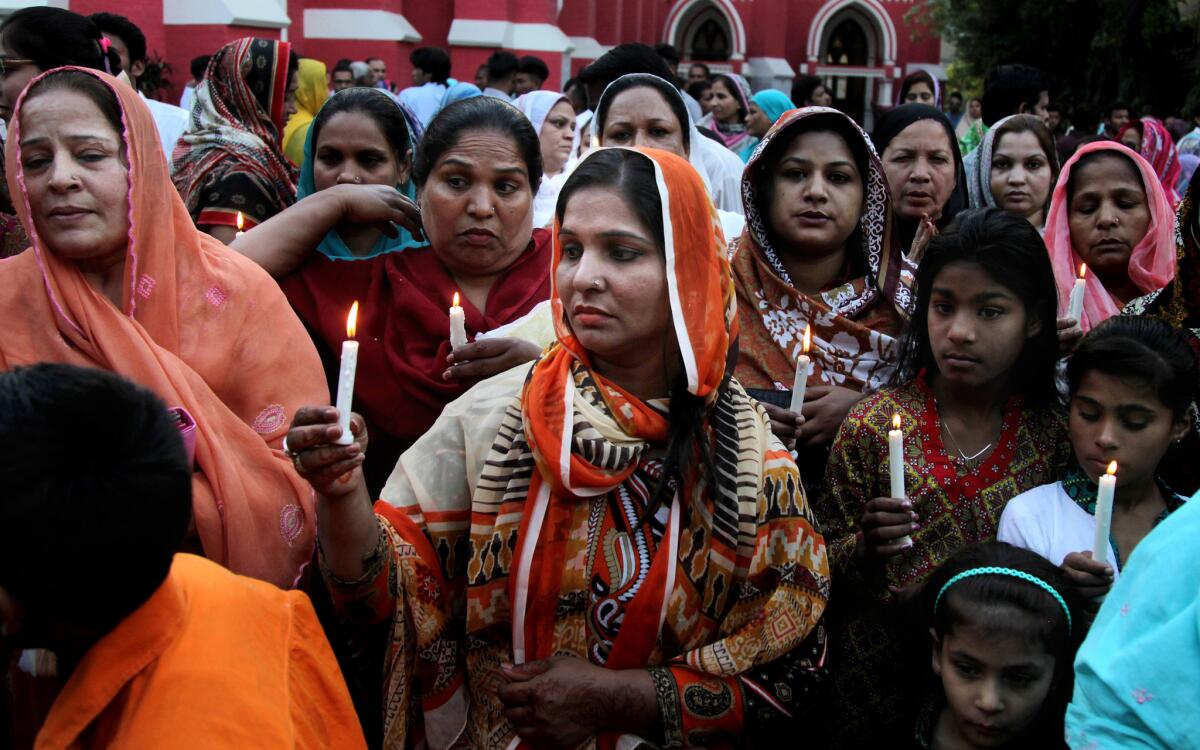Police round up at least 5,221 suspects and kill 5 in a shootout after Lahore bombing

Pakistani Christians hold candles during a prayer ceremony March 29 at St. Anthony’s Church in Lahore for the victims of Sunday’s suicide bombing.
- Share via
Reporting from Mumbai, India — Pakistani counter-terrorism police killed at least five people Wednesday and arrested scores more in what it described as an intensified crackdown following a deadly suicide bombing at a public park in the eastern city of Lahore.
Police in Punjab province raided a house in Raiwind, outside Lahore, and killed five suspected militants in a shootout, Pakistani media reported. Nearly 80 people were arrested in total from two other districts in Punjab, Pakistani news channel Geo News reported.
Yet the early days of Pakistan’s probe into Sunday’s bombing at the Gulshan-e-Iqbal park in Lahore, which left 72 people dead including at least 25 children, have renewed criticism of the government’s counter-terrorism policies.
Police and intelligence agencies in Punjab rounded up at least 5,221 suspects in the 24 hours after the attack and had released 5,005 by late Tuesday, the provincial law minister, Rana Sanaullah, told reporters in Lahore. At least 1,000 of those arrested were part of a list of people believed to be involved in anti-state activities or hate speech.
The arrests and subsequent releases gave the appearance of a government “groping in the dark” to demonstrate its resolve following the latest militant attack against civilians, according to a report Wednesday in Pakistan’s Dawn newspaper.
“This is an exercise these security agencies carry out after every attack of this nature,” said Saifullah Mehsud, executive director of the FATA Research Center, which studies militant activity in Pakistan’s Federally Administered Tribal Areas.
“This is more for the consumption of the public,” Mehsud said in an interview. “They just round up these guys, and after a few days, when the furor dies down, they release them for lack of evidence. I don’t see it as any meaningful action.”
Jamaat-ul-Ahrar, a Pakistani Taliban splinter group that claimed responsibility for the bombing, has carried out several high-profile attacks in recent years. Investigators in Punjab said they found evidence at the blast site that matched evidence collected from three other attacks over the past year and a half, including two suicide attacks on churches in Youhanabad last year that killed at least 15 people.
The group said it carried out the park bombing to target Christians celebrating Easter Sunday. Pakistan, an overwhelmingly Muslim nation of 182 million people, has a small Christian minority. At least 14 of the victims at the park were Christians, officials have said.
One of several splinter groups that have broken with the Pakistani Taliban in recent years, Jamaat-ul-Ahrar has quickly established itself as one of the most dangerous, experts said.
Pakistan has long struggled to rein in militants, in part because elements of the Pakistani security establishment have in the past nurtured extremist groups that have carried out attacks in neighboring India and Afghanistan. Militant groups that target the Pakistani state have taken advantage of the havens, experts say.
A nearly two-year-long Pakistani army offensive against militant hideouts in the tribal areas saw a sharp reduction in terrorist attacks inside Pakistan in 2015. Since 2003, more than 21,000 Pakistani civilians have been killed in terrorist violence, according to the South Asia Terrorism Portal, which tracks attacks.
Jamaat-ul-Ahrar fighters crossed the border from the tribal belt into Afghanistan’s Kunar province, where they appear to be unhindered by an Afghan government that is struggling to contain its own Taliban insurgency, Mehsud said.
“It’s pretty obvious that they are being funded very well, whoever is funding them,” Mehsud said. “It’s quite obvious that in Kunar they have a safe haven and that Afghan forces are not doing anything about it. And their network within Pakistan remains intact – the Pakistani security apparatus has failed to break that network.”
Follow @SBengali on Twitter for more news from South Asia
More to Read
Sign up for Essential California
The most important California stories and recommendations in your inbox every morning.
You may occasionally receive promotional content from the Los Angeles Times.











